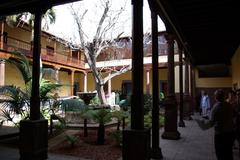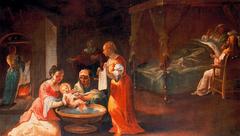Iglesia De La Concepción: Visiting Hours, Tickets, and Historical Sites Guide – San Cristóbal De La Laguna
Date: 04/07/2025
Introduction
Located in the historic center of San Cristóbal de La Laguna, Tenerife, the Iglesia de Nuestra Señora de la Concepción stands as a beacon of the island’s religious and architectural legacy. Established shortly after the Spanish conquest in 1496, it is the first parish church on Tenerife and an enduring symbol of Christianization for the indigenous Guanche people. As a cornerstone of the UNESCO World Heritage city, the church features an iconic 28-meter Tuscan-style bell tower—home to the largest bell in the Canary Islands and offering panoramic views of La Laguna’s historic district (turismo.aytolalaguna.es, Spain.info, Ayuntamiento de La Laguna).
Renowned for its unique blend of Mudéjar, Baroque, and Neoclassical styles, the church houses richly carved wooden ceilings, Gothic and Baroque altarpieces, volcanic stone columns, and a significant collection of sacred art—including works by Fernando Estévez and other notable Canarian artists (Canarias Lovers, Wikipedia). Free admission, optional guided tours, and access to the bell tower make this a must-visit destination for history enthusiasts, art lovers, and spiritual travelers alike (turismo.aytolalaguna.es, Visit Canary Islands).
Table of Contents
- Introduction
- Historical Overview
- Visiting Information
- Visitor Experience
- Special Events and Religious Services
- Frequently Asked Questions (FAQ)
- Enhance Your Visit
- Conclusion
Historical Overview
Founding and Early Development
The church was established in 1496, following the conquest of Tenerife. The first mass was celebrated during the Corpus Christi festival that year (turismo.aytolalaguna.es). Initially built with humble materials, the current stone structure was completed in stages, with its three-nave layout finalized by 1558 (es.wikipedia.org).
Architectural Evolution and Key Features
The Bell Tower
The 28-meter bell tower, constructed definitively between 1694 and 1697 and rebuilt in the 18th century, is modeled after Turin Cathedral’s bell tower. It offers panoramic city views and houses the largest bell in the Canary Islands (turismo.aytolalaguna.es).
Nave, Chapels, and Facades
The interior features three naves divided by semicircular arches on volcanic stone columns, and chapels with significant altarpieces and artworks. The main façade combines Mudéjar, Baroque, and Neoclassical elements, with a prominent semicircular arch and detailed stonework (Canarias Lovers).
Artistic Heritage and Sacred Art
The church’s sacred art includes sculptures by Fernando Estévez, Baroque altarpieces, a 15th-century Sevillian baptismal font, and a silver processional platform by Damián de Castro. Paintings by prominent Canarian artists further enrich its collection (Visit Canary Islands).
Religious Significance and Events
Iglesia de la Concepción is central to Tenerife’s spiritual life, hosting major religious events such as the Corpus Christi procession, the Feast of the Immaculate Conception, and special Masses. It safeguards notable relics, including a fragment of the Lignum Crucis and the oil of Saint John the Evangelist (es.wikipedia.org).
Preservation and Modern Role
Declared a Historic-Artistic Monument in 1948, the church has undergone major restorations, especially after the 1972 roof collapse. Between 2002 and 2014, it served as the temporary cathedral of La Laguna (Ayuntamiento de La Laguna).
Visiting Information
Visiting Hours
- Monday to Saturday: 10:00 AM – 1:30 PM and 4:00 PM – 7:00 PM
- Sundays and Public Holidays: 10:00 AM – 1:30 PM
Hours may change during religious festivals or special events. Check the official website for updates.
Tickets and Admission
- Entry to the main church is free.
- Bell tower access: €2–€3 (discounts for children under 12 and seniors).
- Guided tours may incur a small fee.
Accessibility
- The church is wheelchair accessible via ramps; staff assistance is available.
- The bell tower is not accessible to visitors with mobility impairments.
Guided Tours and Audio Guides
- Guided tours are available in Spanish and occasionally in English.
- Group tours (minimum 10 people) can be arranged in advance (La Laguna Turismo).
- Audio guides may be offered for a nominal fee.
Getting There and Nearby Attractions
- Address: Calle Obispo Rey Redondo, 9, 38201 San Cristóbal de La Laguna, Tenerife.
- Public Transport: Tenerife Tram Line 1 (“La Trinidad” or “La Laguna” stops); TITSA buses serve the area.
- Nearby Attractions:
- Catedral de La Laguna
- Museo de Historia y Antropología de Tenerife
- Plaza del Adelantado
Visitor Experience
Dress Code and Etiquette
- Modest dress is requested (cover shoulders and knees).
- Remove hats upon entry.
- Maintain silence, especially during religious services.
- Photography is permitted without flash, except during Mass or in designated areas.
Facilities and Amenities
- Restrooms: Not available inside the church; public facilities are nearby.
- Gift Shop: Sells religious items and guidebooks.
- Seating: Benches throughout the nave.
- Wi-Fi: Not available inside; accessible in local cafes.
Safety and Security
- The church is safe and staffed during opening hours.
- Keep belongings secure during crowded events.
Best Times to Visit
- Weekday mornings are quietest.
- The bell tower is popular at sunset.
- Expect crowds during Corpus Christi, Feast of the Immaculate Conception, and Holy Week.
Special Events and Religious Services
- Mass: Daily; schedule posted at the entrance and on the parish website.
- Corpus Christi: Renowned for floral carpets in the streets.
- Semana Santa (Holy Week): Processions and special liturgies.
- Feast of the Immaculate Conception: Annual patronal festival.
Frequently Asked Questions (FAQ)
Q: What are the visiting hours?
A: Monday to Saturday, 10:00 AM–1:30 PM and 4:00 PM–7:00 PM; Sundays and holidays, 10:00 AM–1:30 PM.
Q: Is there an admission fee?
A: Church entry is free; bell tower access costs €2–€3.
Q: Are guided tours available?
A: Yes, in Spanish and sometimes English; group tours require advance booking.
Q: Is the church wheelchair accessible?
A: The main church is accessible; the tower is not.
Q: Can I take photos inside?
A: Yes, except during services or in restricted areas.
Enhance Your Visit
- Download the Audiala app for self-guided audio tours.
- Explore official resources and related articles for deeper insights.
- Follow local tourism channels for event updates.
Conclusion
Iglesia de la Concepción is a jewel of Tenerife’s religious and cultural heritage, offering visitors a journey through centuries of history, art, and tradition. Free admission, accessible facilities, and a wealth of artistic and spiritual treasures make it an essential stop in San Cristóbal de La Laguna. Plan your visit, climb the bell tower for breathtaking views, and immerse yourself in the living history of the Canary Islands.
Useful Links and References
- Iglesia de Nuestra Señora de la Concepción – Official Tourism Site
- Canarias Lovers – Visiting Guide
- Ayuntamiento de La Laguna – Monumentos
- Iglesia de la Concepción – Parish Website
- Visit Canary Islands – La Concepción Church
- Spain.info – Church Nuestra Señora de Concepción
- Museo de Historia y Antropología de Tenerife
- Catedral de La Laguna
For the latest updates on visiting hours and events, always consult the official website before your trip.

